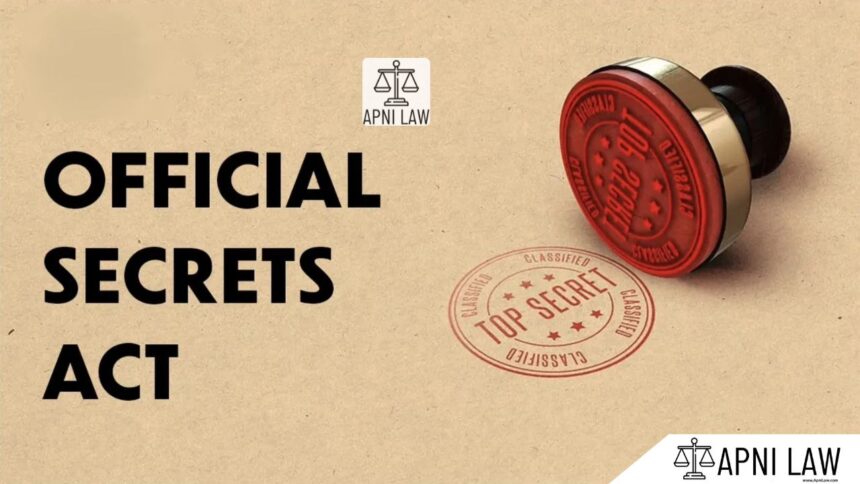What Is The Official Secrets Act, 1923?
The Official Secrets Act, 1923 is an Indian legislation designed to safeguard national security by preventing the unauthorized disclosure of sensitive government information. Enacted during the British colonial era, this Act remains in force today, underscoring its enduring significance in India’s legal framework.
The Act criminalizes activities that involve spying, unauthorized access to protected sites, and the dissemination of classified information. Its primary objective is to protect the nation’s defense and intelligence infrastructure from potential threats.
The Act extends to:
- All citizens of India, regardless of their location.
- Government officials and public servants.
- Individuals in possession of or having access to official information.
What Are Penalties for Spying Under Section 3 Of the Official Secrets Act, 1923?
- The Act punishes acts that threaten India’s security or national interests.
- Any unauthorized approach to a prohibited place is a punishable offense.
- Creating or possessing sketches, plans, or notes that may aid an enemy is illegal.
- Sharing secret official codes, passwords, or sensitive documents is prohibited.
- Disclosing information that affects India’s sovereignty, integrity, or foreign relations is punishable.
Punishments:
- Up to 14 years imprisonment for offenses linked to defense, military, or intelligence establishments.
- Up to 3 years imprisonment for all other unauthorized disclosures.
- The law does not require proof of a specific harmful act.
- If the accused’s conduct or known character suggests intent to harm, they can be convicted.
- Any secret document or information handled without legal authority is presumed to be for harmful purposes.
What Is The Punishment For Wrongful Communication of Official Secrets Under Section 5 Of The Official Secrets Act?
- Anyone possessing secret official information must handle it with strict care and legality.
- The law applies to government officials, contractors, and anyone who accessed such information due to their official role.
- The Act covers secret codes, passwords, plans, sketches, notes, documents, and related materials.
Offenses Include:
- Sharing secret information with unauthorized persons.
- Using confidential data to benefit a foreign power or harm national security.
- Keeping secret material without legal right or against official orders.
- Ignoring safety protocols or acting carelessly with sensitive information.
- Receiving secret material knowingly, when it violates the law.
- Disclosing war-related information to foreign powers or in a way that threatens State security.
Punishment:
- Offenders may face imprisonment up to 3 years, or
- A monetary fine, or
- Both fine and imprisonment depending on the severity of the offense.
What Is The Punishment for Attempts and Abetment Under Section 9 Of the Official Secrets Act, 1923?
- The law punishes anyone who attempts to commit an offense under this Act.
- It also applies to those who abet or encourage the commission of such offenses.
- The punishment is the same as if the person had committed the actual offense.
- Authorities can proceed legally against the person in the same way as they would for a completed offense.
Bombay High Court Ruling On Police Station Not a ‘Prohibited Place’ Under Official Secrets Act, 1923
The Bombay High Court, in Subhash Rambhau Athare v. State of Maharashtra, ruled that actions inside a police station do not fall under Section 3 of the Official Secrets Act, 1923 (OSA).
- The applicant, a Mumbai police constable, challenged an FIR filed at Pathardi Police Station.
- The FIR cited Section 120B and Section 506 of IPC and Section 3 of the OSA.
- The applicant claimed the FIR was false and fabricated.
- On April 21, 2022, three individuals trespassed his house in Pathardi and allegedly assaulted his mother.
- The police only registered a non-cognizable (NC) case on April 26, 2022.
- When the applicant questioned this, the Investigating Officer allegedly abused and mistreated him.
- The applicant was threatened on May 2, 2022, and warned to withdraw the complaint or face a false atrocity charge.
- He recorded the threat and filed a complaint with the Director General of Police.
- The applicant argued that the FIR was retaliation and based on falsehoods.
Court’s Observations:
- The Court noted that the alleged incidents took place inside a police station.
- It stated that Section 2(8) of the OSA defines “prohibited place,” and police stations are not included.
- Therefore, actions inside a police station do not attract Section 3 of the OSA.
- The Court ruled that the OSA was wrongly invoked in this case.
- It left it to the concerned court to decide if offenses under Sections 120B and 506 of the IPC were made out.
- As a result, the Court partly allowed the applicant’s plea.
- This ruling reinforces that not all government premises are “prohibited places” under the Official Secrets Act, 1923.
Conclusion
While the Act plays a crucial role in national security, it has faced criticism for its broad definitions and potential to suppress freedom of expression. Notably, its overlap with the Right to Information Act, 2005, has sparked debates on transparency and accountability. The Supreme Court of India has emphasized that the RTI Act overrides the Official Secrets Act in cases where public interest is served.
In recent years, there have been discussions about amending the Act to align it with contemporary democratic values and technological advancements. Proposals include clearer definitions of “official secrets” and provisions to protect whistleblowers acting in the public interest
The Official Secrets Act, 1923, remains a cornerstone in India’s efforts to protect national security. However, balancing this with the principles of transparency and freedom of expression continues to be a subject of ongoing discourse and legislative consideration.








